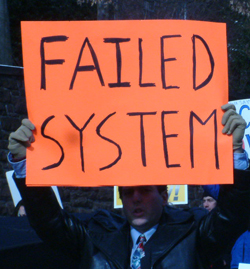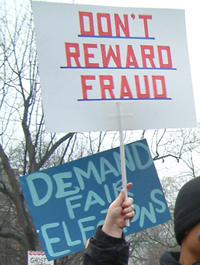Elections 2012
• Demand Equal Participation in Elections for All Third Parties
• Constitution Party Kicked Off the Pennsylvania Ballot • Green Party Stays on Ballot in Pennsylvania
• Third Party Candidates for President in 2012 Elections
Demand Equal Participation in Elections
for All Third Parties
 A main feature of the U.S. electoral set-up is its exclusion of third parties from the electoral process. The requirements vary from state to state, for collecting signatures and for validating them. Commonly 3-5,000 signatures, and in some states more than 10-20,000 signatures must be secured from registered voters only. The people gathering signatures must also be registered voters and, depending on the state, people who are residents of the state and sometimes even of the specific district where signatures are gathered. Some states also require a second registered voter to be present to verify the signature, meaning two people are need for every one signature gathered. As well, the signatures must be gathered within a specific, relatively short period of time. These gathering times may be the same in several states, thus for a presidential candidate, numerous teams and funds for them are needed at the same time (see chart below).
A main feature of the U.S. electoral set-up is its exclusion of third parties from the electoral process. The requirements vary from state to state, for collecting signatures and for validating them. Commonly 3-5,000 signatures, and in some states more than 10-20,000 signatures must be secured from registered voters only. The people gathering signatures must also be registered voters and, depending on the state, people who are residents of the state and sometimes even of the specific district where signatures are gathered. Some states also require a second registered voter to be present to verify the signature, meaning two people are need for every one signature gathered. As well, the signatures must be gathered within a specific, relatively short period of time. These gathering times may be the same in several states, thus for a presidential candidate, numerous teams and funds for them are needed at the same time (see chart below).
For New York State, for example, 15,000 valid signatures of registered voters are needed for presidential candidates, with at least 100 valid signatures from each of half of the state’s 27 congressional districts. These signatures must be collected by two registered voters, one to secure the signature and one to verify it. They could not be collected prior to July 10, and were due on August 21, less than 45 days. Currently four of the third parties have secured ballot access in New York: Greens, Justice (as write-in), Libertarians and Party for Liberation and Socialism.
Democrats and Republicans do not have to meet these same requirements. For many states, having a state-level candidate that secures 2-5 percent of the vote in the previous election for Governor automatically provides ballot status. Given Democrats and Republicans are the parties of the rich, organized and funded by them, for them, and are widely promoted by the state and monopoly media as the only choices, they automatically qualify. Some states also require these two parties to secure a smaller number of signatures.
In addition, there are different procedures for having the signatures validated. These rules are often changed and/or arbitrarily applied by the Secretary of State of the given state, meaning a Democrat or Republican. The third party involved then must challenge these rulings by the Secretary of State in court or accept being removed from the ballot. As well, Democrats and Republicans also routinely challenge signatures of third party candidates to keep them off the ballot. These court challenges can be very expensive and time-consuming, forcing the small parties to spend their time and resources simply getting on the ballot, rather than campaigning. And even when they meet the ballot requirements they are forced off because they cannot meet the financial costs involved in court cases. The Constitution Party, for example, was unable to meet a challenge by Republicans in Pennsylvania for lack of funds. Various challenges of signatures against third parties are also taking place in Michigan, Illinois, Ohio and other states.
All of these ballot requirements for candidates are in addition to requirements for getting the individual parties registered in each state. This often involves securing ballot status for at least one candidate at the federal level, spending $5000 to do so and having a party structure approved by the state.
Given the obstacles and arbitrary actions by Democrats and Republicans, either through court challenges or their Secretaries of State, it is rare for a third party to be on the ballot in all fifty states. For this year, the Libertarians, for example, are so far on the ballot in 42 states and the Green Party in 32 and three others in less than 15 and the rest in less than 5.
It is an unequal and discriminatory set-up that claims to be “free and fair.” The Pennsylvania constitution even requires that “Elections shall be free and equal.” Yet it is one of the most difficult for third parties, requiring 20,601 signatures for presidential candidates for 2012.
In this modern day, when most other industrialized states have numerous parties participating in elections, the U.S. set up is designed to exclude third parties. Just what are the Democrats and Republicans so afraid of? And how can they speak repeatedly about equal opportunity when election laws block participation by third parties and the voters they represent?
A modern democracy requires an equal right to elect and be elected which means all parties and candidates wishing to participate must have equal standing — must be able to participate on an equal basis. This requires public funding only of the process, not the candidates. It requires a process that informs the voters equally about all the parties and candidates and enables them all to compete on an equal basis. This means including all of them in debates and providing equal media coverage for all. Anything less is unequal, unfair, outdated and serving to keep the people out of governance at a time when the role of the people in governance must be increased and raised to the level of decision makers.
Signatures and Filing Deadlines for Various States
JULY
6 – Nevada candidate petition due (7,013 signatures)
13 – Connecticut candidate petition due (7,500 signatures)
15 – Oklahoma candidate petition due (43,890 signatures)
30 – New Jersey candidate petition due (800 signatures)
30 – Missouri party petition due (10,000 signatures)
31 – Nebraska party petition due (4,880 signatures)
AUGUST
1 – Montana candidate petition due (5,000 signatures)
1 – Pennsylvania candidate petition due (20,601 signatures)
6 – Kansas candidate petition due (5,000 signatures)
6 – Georgia candidate petition due (51,845 signatures)
7 – South Dakota candidate petition due (3,171 signatures)
7 – Wisconsin candidate petition due (2,000 signatures)
8 – Alaska candidate petition due (3,271 signatures)
8 – New Hampshire candidate petition due (3,000 signatures)
14 – Minnesota candidate petition due (2,000 signatures)
17 – Iowa candidate petition due (1,500 signatures)
21 – Delaware registration deadline (650 registrants)
24 – Virginia candidate petition due (10,000 signatures)
28 – Oregon registration deadline (10,332 registrants)
28 – Wyoming candidate petition due (3,740 signatures)
28 – Nebraska candidate petition due (2,500 signatures)
28 – Washington candidate petition due (1,000 signatures)
31 – Idaho candidate petition due (1,000 signatures)
SEPTEMBER
4 – Kentucky candidate petition due (5,000 signatures) [TOP]
6 – Alabama candidate petition due (5,000 signatures)
7 – North Dakota candidate petition due (4,000 signatures)
7 – Rhode Island candidate petition due (1,000 signatures)
Constitution Party Kicked Off
the Pennsylvania Ballot
 On Tuesday, the Constitution Party — whose presidential ticket consists of former U.S. House member Virgil Goode and Lancaster, Pennsylvania attorney James Clymer — withdrew their petition to get on the ballot in Pennsylvania. The decision came after multiple warnings of the court costs by attorneys for the Republican Party, who have challenged the Constitution and Libertarian parties’ ballot petitions.
On Tuesday, the Constitution Party — whose presidential ticket consists of former U.S. House member Virgil Goode and Lancaster, Pennsylvania attorney James Clymer — withdrew their petition to get on the ballot in Pennsylvania. The decision came after multiple warnings of the court costs by attorneys for the Republican Party, who have challenged the Constitution and Libertarian parties’ ballot petitions.
“The challenge represented a monolithic establishment party which is intent on denying people the opportunity to vote for anyone who might criticize it from a limited government, non-interventionist perspective,” notes vice-presidential candidate James Clymer to Philadelphia Weekly (PW). “It used its almost limitless resources to take advantage of laws designed by Republicans and Democrats to make sure no other party has a place at the election table and court decisions that have supported raising the hurdles a third party has to jump over to get to a general election.”
The Constitution Party had turned in about 35,000 signatures to Harrisburg on August 1, plenty more than the 20,601 third parties are required to get on the ballot. In an act one Libertarian party member referred as “extortion” to PW, Republican Party lawyers had warned the Constitution and Libertarian Parties that their court costs could reach more than $100,000 if they lost signature challenge bids. (In Pennsylvania, candidates kicked off the ballot can be forced to pay their opponents’ legal fees.) That forced the Constitution Party, who has already paid about $50,000 in legal fees, to blink. The Libertarian party has not, yet.
“This means yet another voice in Pennsylvania is stilled,” said Bob Small, facilitator for the Pennsylvania Ballot Access Coalition — a nonprofit that fights for third parties — upon receiving the news.
A member of the Green Party, Small calls himself “basically a free agent” in the fight for third-party ballot access — which is why he had been volunteering for the Goode campaign. The Green Party, surprisingly, has not been challenged this year by Democrats, who have kept statewide Green candidates off the ballot since 2004.
A previous statement on the Constitution Party of Pennsylvania’s website had asked for both volunteers and cash to fight the Republicans’ challenge.
“The court has ordered that we have a large group of volunteers (20 minimum) to assist in the checking of names and addresses with their database this coming Monday morning in Philadelphia. This could take several days and we need lots of help lined up since not everyone will be able to stay the full time,” the statement read. “Several of us are carpooling and getting rooms to share for lodging. Please advise us if you would like to be included in our arrangements.”
Getting off the ballot, admits Constitution Party secretary and write-in candidate for Pennsylvania State Treasurer Donna Fike, “came down to money. We do not have the large sums of money the two major parties have access to. We are patriots who feel a sense of duty to leave this country better for our children and grandchildren than it is now. We do this at our own expense.”
She adds the party is often “pushed around by unfair rules set up by those with the money to enforce them and a court willing to go along. I am disappointed in what I thought would be a somewhat fair process.”
The Libertarian Party of Pennsylvania is also fighting a challenge by the Republican Party. They handed in about 49,000 signatures to get former New Mexico Governor Gary Johnson on the ballot for president, 44,000 of which are being challenged by Republicans. Johnson recently made national news when he suggested Republican vice-presidential candidate Paul Ryan is not a libertarian, in spite of many claiming otherwise. Libertarian party members and volunteers have previously told PW they are confident they have the required number of validated signatures to claim a ballot position in November.
“Ballot access laws that discriminate against new or third parties should definitely be changed,” adds Clymer. “There are 40-plus states with ballot access laws substantially less restrictive than those of [Pennsylvania] that could serve as a model but the first step would be to follow the PA Constitution, specifically Article One, Section 5 that mandates “Elections shall be free and equal.” That includes equality in access to the ballot. There is no reason an established political body or minor party should be required to collect more than ten times the number of signatures as the major parties.” (August 23, 2012)
(http://blogs.philadelphiaweekly.com/phillynow/2012/08/23/constitution-party-kicked-off-the-pennsylvania-ballot)
[TOP]
Green Party Stays on Ballot in Pennsylvania
 There is a first time for everything. And 2012 appears to be the first time since 2004 the Green Party of Pennsylvania will put statewide candidates on the commonwealth’s election ballot. The deadline for a ballot challenge from the Democratic Party came and went last week, without a challenge. On the other side of the alternative politicosphere, however, the Constitution and Libertarian parties were not so lucky.
There is a first time for everything. And 2012 appears to be the first time since 2004 the Green Party of Pennsylvania will put statewide candidates on the commonwealth’s election ballot. The deadline for a ballot challenge from the Democratic Party came and went last week, without a challenge. On the other side of the alternative politicosphere, however, the Constitution and Libertarian parties were not so lucky.
Deadline Passes
The deadline to challenge all ballots in Pennsylvania was Wednesday, August 8th at 5 p.m. That deadline came and went, and there was no challenge to the Greens. PW contacted Party Chair Carl Romanelli earlier today, who says there has still been no news to report regarding a challenge — which would appear even murkier being as it would have been post-deadline.
On July 31, Green Party presidential ticket Dr. Jill Stein and local activist Cheri Honkala handed in more than 35 thousand signatures after a 2-week run to collect almost 70 percent of that. The Party, and all Pennsylvania third parties, are required to hand in 2 percent of the most votes gotten by a candidate in the previous election. This year, that number was 20,601 signatures, compared with a 2,000 benchmark for Republican and Democratic candidates.
While Pennsylvania Greens called themselves “ecstatic” at the deadline passing, Romanelli noted in a press release that some Green Party petitioners did not participate. And you can blame that one on earned cynicism.
“We had so many of our longtime members working since early March to collect signatures, but we also had many skilled petitioners who did not participate, as the hard work in previous years was nullified by our candidates withdrawing from the challenge, rather than to defend it,” noted Romanelli. “This is clearly due to the regressive practice in Pennsylvania of assessing legal fees and costs on challenges not defended successfully. In addition, the excitement of our strong presidential ticket of Stein/Honkala assured we would obtain a suitable number of signatures.”
During Romanelli’s own run for Senate in 2006, he handed in more than 100,000 signatures, the most in state history, and was still kicked from the ballot.
Late last month, the Green Party had actually been sending out fundraising emails making note of what they called Pennsylvania’s “rigged” election system, which favors mainstream politics. Vice Presidential candidate Cheri Honkala noted to Philadelphia Weekly (PW) in an interview last month that she would spend some of the election season bringing attention to the weird ballot access laws of her home state.
Green Party of Philadelphia spokesman Chris Robinson noted before Cheri Honkala was chosen as vice president, that she has grown the Green Party throughout the city—and especially in Kensington, where she lives. Green Party registration in the 31st Ward has grown 54 percent since 2009, which represents the biggest gains in the city.
“Things looked grim in June,” said Green Party coordinator Hillary Kane, “but the energy and hard work of Jill and Cheri clearly put us over the top. These candidates are not only incredible organizers, but their message resonates with many working class voters.”
On August 1, Kane stayed in Harrisburg overnight to make sure the Secretary of State received all the signatures. That same day, Stein and Honkala were in Philadelphia, protesting against foreclosures carried out by Fannie Mae. They were arrested for their activism. Stein and Honkala are currently on the ballot in 30 states and the District of Columbia.
Things are looking a bit more dire, though, for the Constitution and Libertarian parties in Pennsylvania, who are both being challenged by the Republican Party—one which has not been shy about scoring undemocratic points in the name of electoral wins recently.
Challenges from the Right
Also on August 8, two attorneys working for Republican Party officials filed challenges to the validity of the Libertarian and Constitution parties’ statewide petitions. One of the attorneys who filed a petition is the same who filed the challenge to the same right-of-center parties in 2010, and who warned the parties that they might face court costs as high as $110,000, according to Ballot Access News.
In Pennsylvania, the party who loses their case is required to pay the legal fees of the winner. The 2010 warning was felt by the candidates, most notably Libertarian gubernatorial candidate Marakay Rogers, who fled from the ballot after a similar challenge.
The Libertarian presidential candidate this year is former New Mexico Governor Gary Johnson, who had previously run for president as a Republican, though was removed from the debates after not receiving the threshold for percentage of support and money raised. His views were far from the Republican rank-and-files, as well.
The former chairman of the Libertarian Party has called the Republican Party’s claim that they want fair elections “a load of crap” in light of the challenge. The Libertarian Party submitted about 42 thousand signatures to get on the ballot.
Legal Mumbo-Jumbo
Also according to Ballot Access News, lawyer Oliver Hall of the Center of Competitive Democracy filed a request for injunctive relief in federal court—against the Pennsylvania challenge system as it currently stands. Hall is representing the Constitution, Green and Libertarian parties in the case. He and the Center, based in D.C., have been focusing on Pennsylvania’s system for several years.
In an interview with PW earlier this year, Hall noted that “No other state has such a system” which requires losing candidates to pay the winner’s fees. Pennsylvania is also considered one of the worst states in the country for ballot access, being as it requires 10 times — or more, depending on the year — the amount of signatures for third party candidates. Colorado, for instance, currently has 17 candidates on the ballot for president. If the current challenges go as they have in recent years, Pennsylvania will likely have three candidates on the ballot.
“Without relief from the federal court, the Libertarian and Constitution Parties are placed in the dilemma of either withdrawing their petitions,” notes Ballot Access News, “or risking a judgment that court costs of perhaps $100,000 or more are owed to the challengers.”
Both Romanelli and former Green Party Presidential candidate Ralph Nader owe tens of thousands of dollars to the Democratic Party, stemming from recent challenges. (Philadelphia Weekly)
[TOP]
Third Party Candidates for President in 2012 Elections
As part of informing our readers about third party candidates in the 2012 presidential elections, we provide below information concerning ballot access these parties have attained.
There are only two third parties, the Green Party and Libertarian Party that have secured ballot access in enough states to have the 270 or more Electoral College votes needed to win a presidential election. Three others currently have ballot access in more than ten states, the Constitution Party, Justice Party and the Party for Liberation and Socialism. The rest of the third parties have even more limited access. This means that voters in most states cannot vote for these candidates even if they wish to do so.
Below is information on these five parties and states where they are on the ballot or seeking ballot access, which they may yet secure before the November election. We also list additional parties and their candidates.
Libertarian Party
 The Libertarian Party is running Gary Johnson, former Governor of New Mexico for president and Judge James P. Gray of California for vice-president. The Libertarian Party has secured ballot access in 43 states plus Washington, DC for the 2012 presidential election.
The Libertarian Party is running Gary Johnson, former Governor of New Mexico for president and Judge James P. Gray of California for vice-president. The Libertarian Party has secured ballot access in 43 states plus Washington, DC for the 2012 presidential election.
The Libertarian Party is on the ballot in: Alaska, Arizona, Arkansas, California, Colorado, Connecticut, District of Columbia, Delaware, Florida, Georgia, Hawai’i, Idaho, Illinois, Indiana, Iowa, Kansas, Louisiana, Maine, Maryland, Massachusetts, Minnesota, Mississippi, Missouri, Montana, Nebraska, Nevada, New Hampshire, New Jersey, New Mexico, New York, North Carolina, North Dakota, Ohio, Oregon, South Carolina, South Dakota, Tennessee, Texas, Utah, Vermont, Virginia, Washington, West Virginia, Wisconsin, Wyoming, and Washington, DC
The Libertarian Party is seeking ballot access in: Alabama, Connecticut, Kentucky, Michigan, Oklahoma, Pennsylvania, Rhode Island,
Green Party
The Green Party is running Dr. Jill Stein of Massachusetts for president and Cheri Honkala of Pennsylvania for vice-president. Their party is on the ballot in 32 states and Washington, DC. It is currently seeking ballot access in 14 states.
The Green Party is on the ballot in: Alaska, Arizona, Arkansas, California, Colorado, Delaware, District of Columbia, Florida, Hawai'i, Idaho, Illinois, Iowa, Louisiana, Maine, Maryland, Massachusetts, Michigan, Minnesota Mississippi, Montana, New Jersey, New Mexico, New York, Ohio, Oregon, Pennsylvania, South Carolina, Tennessee, Texas, Utah, Washington, West Virginia, and Wisconsin.
The Green Party is seeking ballot access: Alabama, Connecticut, Kansas, Kentucky, Nebraska, Nevada, New Hampshire, North Carolina, North Dakota, Rhode Island, South Dakota, Vermont, Virginia, and Wyoming.
It will appear as write-ins in: Georgia, Indiana, and Missouri.
Constitution Party
The Constitution Party is running Virgil Goode, former U.S. Representative of Virginia for president and Jim Clymer, former chair of the Constitution Party for vice-president and has ballot access in 21 states.
The Constitution Party is on the ballot in: Colorado, Florida, Idaho, Iowa, Michigan, Minnesota, Mississippi, Missouri, Nevada, New Jersey, New Mexico, North Dakota, Ohio, Oregon, South Carolina, South Dakota, Tennessee, Utah, Washington, Wisconsin and Wyoming
It will appear as write-ins in: California, Connecticut, D.C., Georgia, Illinois, Indiana, Maine, Maryland, Massachusetts, Montana, North Carolina, Pennsylvania, Texas, Vermont, and West Virginia
Justice Party
 The Justice Party is running Rocky Anderson, former Mayor of Salt Lake City, Utah for President and Chicano rights activist Luis Rodriguez of California for vice-president. They are on the ballot in 13 states, although in some cases using the ballot line of another party, such as the Independent Party.
The Justice Party is running Rocky Anderson, former Mayor of Salt Lake City, Utah for President and Chicano rights activist Luis Rodriguez of California for vice-president. They are on the ballot in 13 states, although in some cases using the ballot line of another party, such as the Independent Party.
The Justice Party is on the ballot in: Colorado, Connecticut, Florida, Idaho, Michigan, Minnesota, Mississippi, New Jersey, New Mexico, Oregon, Utah, Vermont, Washington.
It has secured write-in status in: Alabama, Alaska, Connecticut, Delaware, Georgia, Iowa, Illinois, Kansas, Maryland, Montana, Nebraska, New Hampshire, New York, Pennsylvania, Texas, and Washington D.C.
It is seeking ballot access in: Tennessee, Mississippi, and Louisiana
Party for Liberation and Socialism
 The Party for Liberation and Socialism is running anti-war activist Peta Lindsay for president and Yari Osorio for vice-president and is on the ballot in twelve states.
The Party for Liberation and Socialism is running anti-war activist Peta Lindsay for president and Yari Osorio for vice-president and is on the ballot in twelve states.
The Party for Liberation and Socialism is on the ballot in: Arkansas, Colorado, Florida, Iowa, Louisiana, Minnesota, New York, New Jersey, Utah, Vermont, Washington and Wisconsin
Additional Parties and Their Candidates
Parties with Ballot Access (usually 5 or fewer states)
• American Independent Party: Tom Hoefling for president and Robert Ornelas, vice-president
• Peace and Freedom Party: Roseanne Barr for President, Cindy Sheehan for Vice President
• Reform Party USA: Andre Barnett for president, Kenneth Cross for vice-president
• America's Party: Tom Hoefling for president, J.D. Ellis for vice-president
• Objectivist Party: Tom Stevens for president, Alden Link, vice-president
• Socialist Workers Party: James Harris for president, Maura DeLuca for vice-president
• Socialist Party USA: Stewart Alexander for president, Alejandro "Alex" Mendoza for vice-president
• American Third Position Party: Merlin Miller for president, Virginia Abernethy for vice-president
• Grassroots Party: Jim Carlson for president and George McMahon for vice-president
Parties with No Ballot Access
• Freedom Socialist Party: Stephen Durham for president, Christina Lopez for vice-president (write-in campaign)
• Modern Whig Party: T.J. O’Hara for president
• Prohibition Party: Jack Fellure for president, Toby Davis for vice-president
• Socialist Equality Party: Jerry White for president, Phyllis Scherrer vice-president
[TOP]
